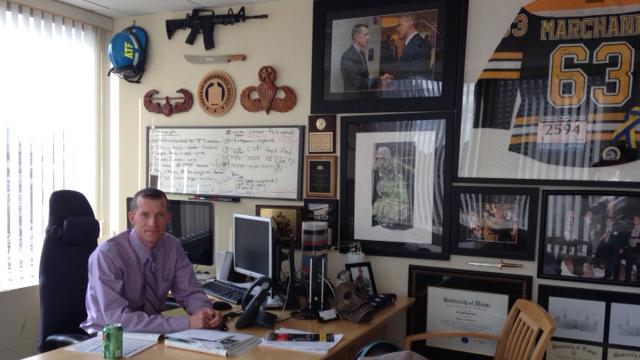For a Boston surgeon and marathoner, this year’s race is a chance to move on
Marathon runner and surgeon David King.
Long-distance runner David King says that as far as marathons go, Boston’s marathon is the greatest. "Once you run Boston, you’re kind of ruined forever on great marathons," he says.
King ran Boston in 2013, and the year before, and the year before that.
"After I cross the finish line, I usually stop and turn around and look backwards," King says. "And I do that because I’m pretty happy to finish, but I like seeing everybody else and their faces and all of their excitement from crossing the finish line."
Last year, King finished and was in a cab on his way home when he realized something wasn’t right. He was getting cryptic text messages — things like, "Are you okay?" "Heard something went wrong." "Heard there was an explosion."
So he headed to work. King is a trauma surgeon at Massachusetts General Hospital in Boston. He arrived at the emergency room just after the first wave of bombing victims.
"They were lined up in the trauma bays and, for me, that was the point where I suddenly knew the whole story back to front," King says. "I didn’t need the news or the FBI or some investigation to tell me what had happened."
King had seen these types of injuries before, as a combat surgeon in the US Army.
King served in Iraq and Afghanistan. He says he remembers one morning in Afghanistan when there was a particularly heavy mortar and rifle attack on his army base. He and his friend started to question why they were there, hunkered down in a bunker, while things were getting blown up all around them.
The answer they came up with was so that the kind of violence they were experiencing in Afghanistan doesn’t come home to the US.
"So our families and our children can sleep safely at night and not have to be exposed to that kind of environment," King says. "And we were okay with that. It made perfect sense."
But if trauma in war makes sense, it doesn’t in a marathon.
In the year since the Boston bombings, King says it’s been hard to reconcile what he calls the dissonance between the marathon and last year’s attack.
"It’s a disturbing thing for the country when there’s a terrorist attack in the homeland," he says. "It’s perhaps more disturbing when it occurs in your own state, more so in your own city, and in this case, really our backyard. But there’s just something deeper and more profound when it happens in your own marathon, and in an event that is supposed to be celebrating health and happiness and achievement. The paradox is pretty profound."
That’s why for the 2014 marathon, King says people have to make a conscious effort not to dwell on tragedy. He says this year’s race should be a massive celebration — one that honors the dead and the injured.
"It shouldn’t be a race honoring a bombing, it should be a race honoring all of the inspiration that came afterwards last year," he says.
King is running again this year, as he has many times before.
When he crosses the finish line and turns around to look at the runners behind him doing the same, he won’t just be looking back. He’ll be moving on.
Our coverage reaches millions each week, but only a small fraction of listeners contribute to sustain our program. We still need 224 more people to donate $100 or $10/monthly to unlock our $67,000 match. Will you help us get there today?
